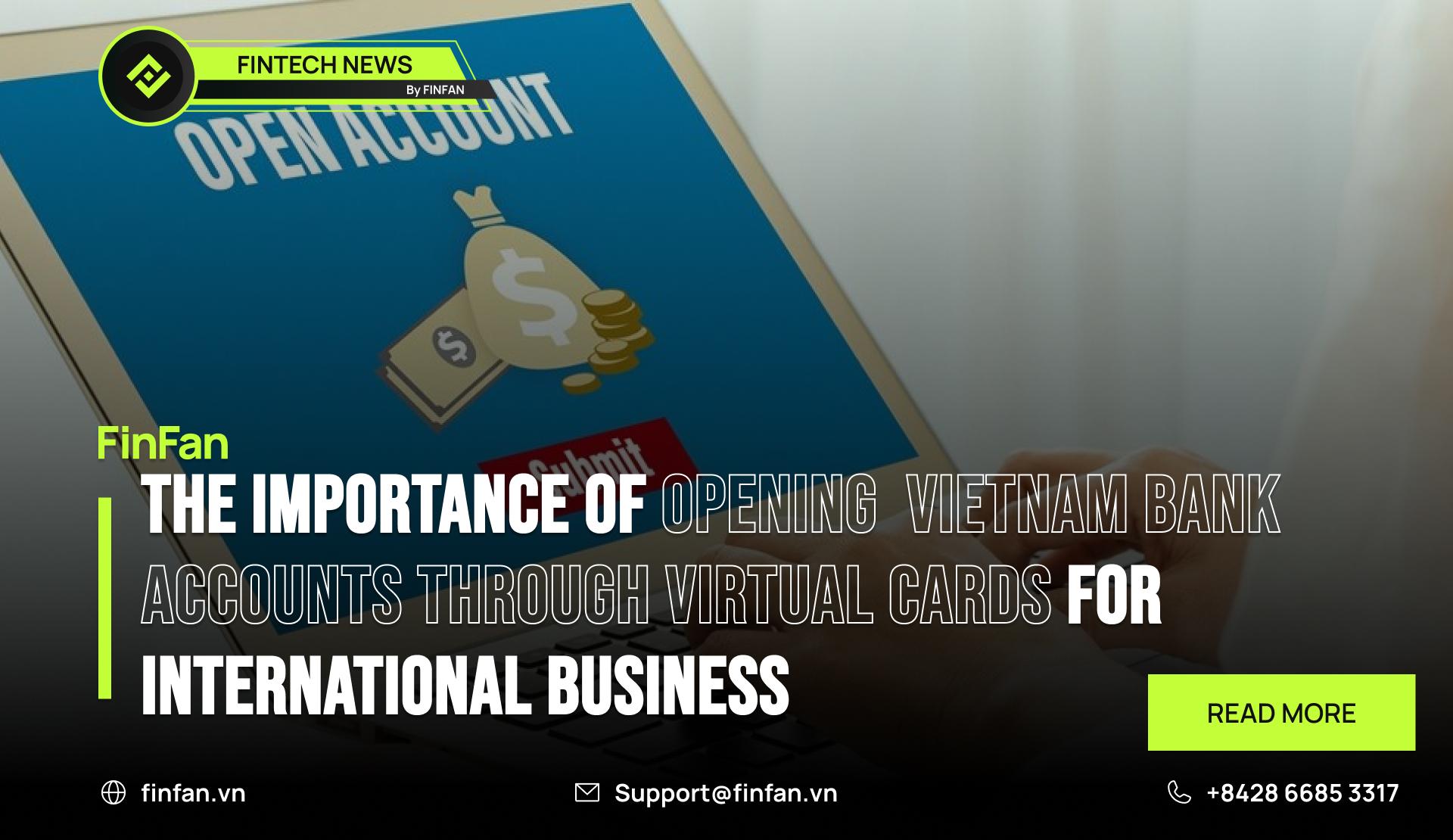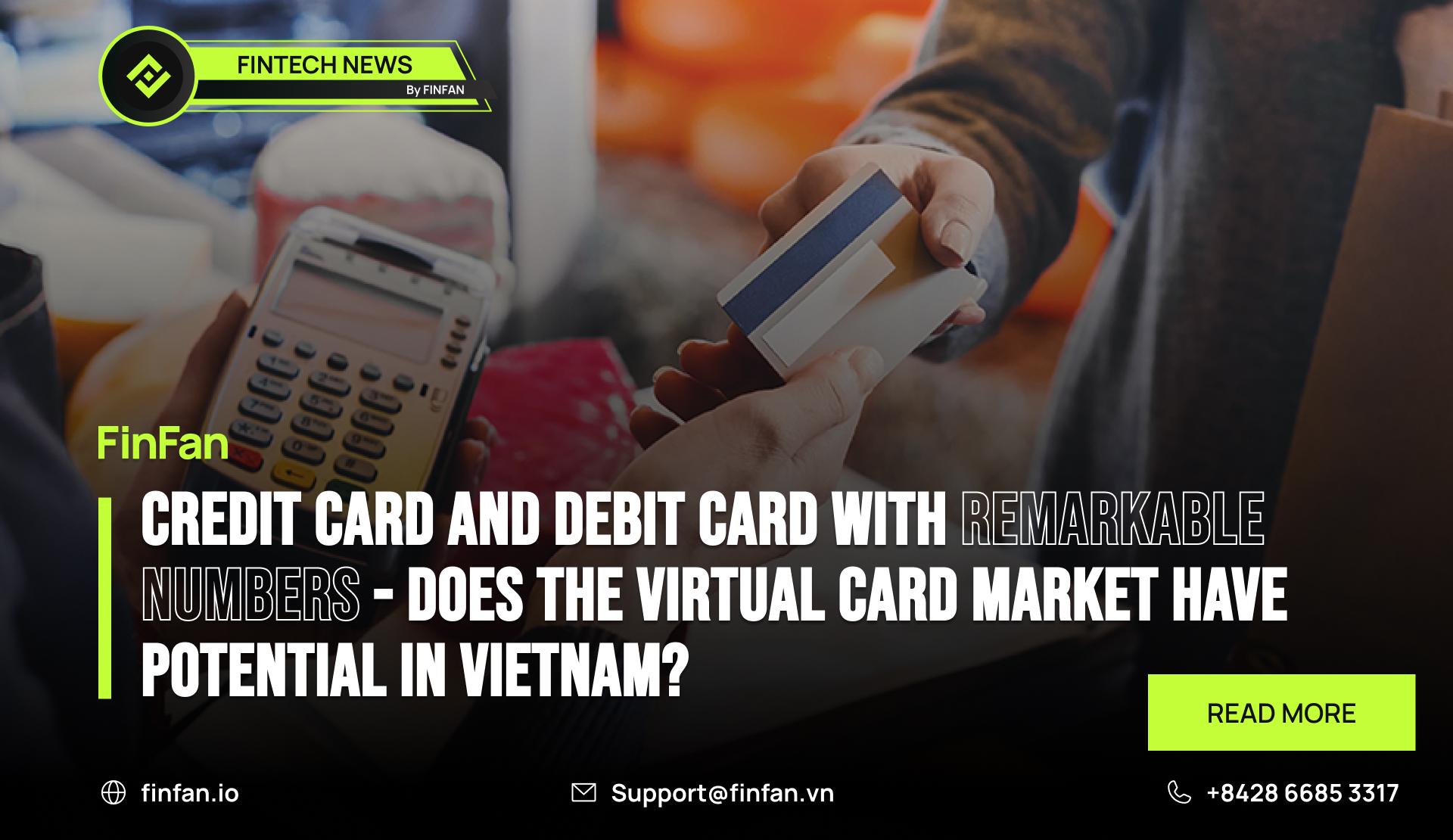Prepaid cards – What are they – Could prepaid cards work effectively as virtual cards

In the last articles about card payments, FinFan mentioned the potential development of credit cards and debit cards in the near future in Vietnam, the US, and global markets.
We have been discussing the link between credit cards, debit cards, and virtual cards and simultaneously have given some comments about the answer to the question of whether virtual cards have potential in Vietnam.
In this article, let us explore another commonly encountered form of card payment with FinFan: prepaid cards.
What are prepaid cards?
Prepaid cards are the type of cards that aren’t linked to bank accounts and are created and provided usually by financial institutions such as fintech organizations.
With prepaid cards, users can deposit funds into the card accounts and spend the same amount of money deposited for various transactions such as purchases online and in-store, as well as ATM withdrawals.
They offer a convenient and flexible alternative to traditional debit and credit cards, particularly for individuals who do not have access to traditional banking services or prefer to limit their spending.
Additionally, prepaid cards often come with features such as budgeting tools, mobile app access, and the ability to reload funds, making them suitable for managing expenses and budgeting effectively.
Common and different points of credit cards, debit cards, and prepaid cards

Some common points of prepaid cards, credit cards, and debit cards
- Payment Convenience
All three types of cards are alternative payments of cash and offer convenient ways to make purchases, whether online, in-store, or via mobile payment apps.
- Card Networks
Credit cards, debit cards, and prepaid cards are often affiliated with major card networks such as Visa, Mastercard, or American Express, which enhances their acceptance and usability.
- Safe payments
These cards typically come with security features such as EMV chips, PINs, and fraud protection measures to safeguard against unauthorized use and fraud based on PCI DSS standards.
All three types of cards ensure the safety of their owners in payment transactions by eliminating the need to carry large amounts of cash and mitigating the risk of theft or loss.
In the event of losing or having your credit, debit, or prepaid card stolen, you can immediately report it to the card issuer and promptly block access to the card. You can then visit the nearest branch to request the issuance of a new card.
The safety of a prepaid card is even better than both credit and debit cards as it is not subject to credit risks.
- ATM Access
Credit cards, debit cards, and prepaid cards can often be used to withdraw cash from ATMs, providing additional flexibility for users.
Differences between debit cards and prepaid cards
Although they both utilize available funds from the account rather than borrowed funds from credit institutions or banks, debit cards and prepaid cards still have the following distinctions:
- Funding Source
Debit cards are linked to a checking or savings account held by the cardholder at a bank or financial institution. Transactions made with a debit card directly deduct funds from the linked accounts.
Prepaid cards are in contrast, users load funds onto the card in advance. Transactions are funded from the prepaid balance.
- Overdraft Protection
Debit cards may be associated with overdraft protection, allowing transactions to proceed even if the available balance in the linked account is insufficient. However, overdraft transactions may incur fees.
Prepaid cards typically do not offer overdraft protection. Transactions are declined if there are insufficient funds available on the card.
- Relationship with Financial Institutions
Debit cards are usually issued by banks or credit unions to their account holders, often as part of a checking or savings account package.
Prepaid cards are different when they are created and provided by various financial institutions, retailers, or prepaid card companies. They are typically not associated with a traditional bank account.
Differences between credit cards and prepaid cards
Similar to debit cards, prepaid cards also have several differences compared to credit cards:
- Source of Funds
Credit cards allow you to borrow money from the issuer up to a certain credit limit to make purchases. You are expected to repay the borrowed amount along with any interest accrued if you don't pay the full balance by the due date.
On the other site, prepaid cards are loaded with funds by the cardholder. They are not linked to a line of credit or a bank account, so you can only spend the amount loaded onto the card.
- Credit Limit
Credit cards have a credit limit set by the issuer. This is the maximum amount you can borrow at any given time.
Prepaid cards do not have a credit limit because you can only spend the amount that has been loaded onto the card.
Another case of prepaid cards is that the cardholder may grant authorization to use the account with a predetermined amount of money planned in advance, and the account user is not allowed to exceed this limit.
A typical example here is opening a prepaid card for the purpose of paying the salaries of employees within a multinational corporation with headquarters domestically.
In this specific scenario:
Cardholder: The owner of the foreign business entity (chairperson or branch director domestically).
Card User: The individual authorized by the cardholder (human resources manager) utilizes the predetermined amount loaded onto the card monthly to disburse salaries to employees of a foreign company with a domestic presence.
Management and Supervision: The cardholder can easily manage and monitor the exact amount disbursed by the human resources manager for paying employee salaries.
- Interest and Fees
With credit cards, if you carry a balance on your credit card beyond the grace period (usually around 25-30 days), you will be charged interest on the remaining balance. Credit cards may also have annual fees, late payment fees, and other charges.
Prepaid cards typically do not charge interest because you are spending your own money. However, they may have fees associated with the initial purchase, reloading funds, ATM withdrawals, or inactivity.
- Credit Check
To qualify for a credit card, issuers typically conduct a credit check to assess your creditworthiness. Your credit history and score influence the terms of the card you're offered.
In contrast, prepaid cards do not require a credit check since you are not borrowing money. They are often available to unbanked and underbanked people with no credit history.
- Building Credit
Proper credit card use can help you build a positive credit history and improve your credit score if you make timely payments and keep your balances low relative to your credit limit.
In the reverse direction, since prepaid cards do not involve borrowing money, they do not impact your credit score, whether positively or negatively.
So, we have now covered the definitions of prepaid cards as well as gained further insight into their similarities and differences with other types of cards commonly seen in the card payment market.
Read more:
Now, let us explore with FinFan the effectiveness of implementing a virtual card model for prepaid cards.
Could prepaid cards work effectively as virtual cards?
The implementation of a virtual card model for prepaid cards can offer numerous benefits and efficiencies in various scenarios. Below are some advantages and ways in which this model can be applied:
- Enhanced Security
Virtual cards, being non-physical, are less prone to loss or theft compared to physical cards. This enhances security for both users and businesses.
- Expense Management
Businesses can create virtual cards with specific spending limits and usage periods to manage expenses such as payments for specific projects, employee discretionary spending, or vendor payments.
- Suitability for Online Environments
Virtual cards are an ideal choice for online transactions, particularly in e-commerce environments, where using physical card information may pose a security risk.
- Cost Savings
Utilizing virtual cards can minimize costs associated with printing and distributing physical cards, as well as eliminate expenses related to managing physical cards such as transactions, shipping, and storage.
- Flexibility
The virtual card model allows businesses to easily create and manage multiple cards with varying parameters according to their specific needs.
- Expense Tracking
Businesses can track and allocate expenses more effectively through financial management systems when using virtual cards, enabling them to gain insights into spending habits and optimize resources.
Read more:
. What is a virtual card? Why should companies integrate virtual cards?
Some types of prepaid cards
- General-Purpose Reloadable Cards
These prepaid cards function similarly to debit cards and can be loaded with funds multiple times. They are often used for everyday expenses, online purchases, and bill payments.
- Gift Cards
Gift cards are prepaid cards typically issued by retailers or financial institutions and are loaded with a specific amount of money. They are popular as gifts and can usually be redeemed at the issuing retailer or a network of affiliated merchants.
Travel Cards
These prepaid cards are designed for travelers and can be loaded with foreign currency. They offer convenience and security when making purchases abroad, as well as the ability to lock in exchange rates.
- Payroll Cards
Employers may use prepaid cards to pay their employees' wages electronically. Employees can access their funds via ATMs or use the card for purchases, similar to a traditional bank account.
- Teen Cards
Teen cards are prepaid cards designed for teenagers and young adults. Parents can load funds onto the card and monitor their child's spending, teaching financial responsibility while providing a convenient payment method.
- Government Benefit Cards
Government agencies may issue prepaid cards to distribute benefits such as unemployment or social security payments. Recipients can use these cards to access their funds instead of receiving paper checks.
- Corporate Expense Cards
Businesses may issue prepaid cards to employees for business-related expenses such as travel, meals, and supplies. These cards allow for easy tracking of expenses and may offer features like expense reporting and integration with accounting software.
- Healthcare Cards
These prepaid cards are used to manage healthcare-related expenses such as medical services, prescription drugs, and health savings account (HSA) funds. They may offer features like flexible spending account (FSA) management and direct payment to healthcare providers.
Having understood the definition of prepaid cards, discerned the differences between this type of card and others in the payment card industry, as well as gained further insights into the types commonly utilized in practice.
It is now time to explore with FinFan the pertinent considerations for cross-border businesses when deciding on a provider of prepaid cards for their business model.
Things to keep in mind when choosing a prepaid card provider for cross-border businesses.
Choose a prepaid card provider that can have multi-currency account support.
Once your business is involved in the international market, you must pay more attention to foreign exchange rates when trading goods, and currencies between different countries to avoid eating into the company's profits.
In that case, having a prepaid card provider that supports multi-currency accounts is extremely important and necessary. This provider can assist you by offering favorable exchange rates to mitigate the issue mentioned.
Read more:
. 4 Benefits of a Multi-Currency Account for Your Business and How to Choose the Right Provider
Choose a prepaid card provider that can help you with instant settlement.
For multinational businesses, there are several instances where instant payments are crucial when dealing with international transactions. Examples include paying employee salaries, monthly utility bills, union dues, etc., which have specific payment deadlines.
In this scenario, your business needs to receive thorough guidance from the business development and customer care departments of prepaid card providers to better understand the 24/7 instant settlement payment process, available even on holidays or Sundays, to support your specific payment needs.
Read more:
. 3 benefits that instant settlement service brings to businesses.
Choose the prepaid card provider compliance with International Regulations
Ensuring that the prepaid card program complies with international regulations and standards, including anti-money laundering (AML) regulations, know-your-customer (KYC) requirements, and data protection laws.
Read more:
. 3 compliance pitfalls fintech cross border payment companies must avoid in 2024
Choose the prepaid card provider with low foreign transaction fees
Selecting a provider that imposes low or no foreign transaction fees for cross-border transactions, helping to minimize costs associated with international payments and withdrawals.
Conclusion about prepaid cards
The above provides some information about prepaid cards and their applications for individuals and businesses.
Through the examples presented, we can see the importance of this card type for business payments, especially for those involved in cross-border transactions, as it can best support businesses in addressing financial-related issues.
Indeed, selecting a prepaid card provider for cross-border business payments involves several stages to make appropriate decisions.
By considering these factors above, cross-border businesses can choose a prepaid card provider that effectively supports their international operations and facilitates seamless financial transactions across borders.
About FinFan
FinFan is a cross-border embedded financial services company that focuses on mass disbursement, fund collection, card processing, IBAN, and digital APMs solutions, which can provide valuable input and integration on and for the same. FinFan already integrated with almost the world's well-known MTOs, PSPs, switch and core fintech platforms as Money Gram, Thunes, Qiwi, Remitly, World Remit, Bancore, PaySend, Terrapay, Ria Money Transfer (Euronet), Dlocal, Ripple, TripleA, FoMo Pay, Wings, etc. For more information, please contact us through:
🌐https://finfan.io
📞(+84) 2866 85 3317
✉ support@finfan.vn
LinkedIn: FinFan
Note:
Regarding a recent incident between FinFan and another technology service provider similar to ours here!
We do not discourage any actions aimed at seeking ideas for articles. However, if there is any use of images or content related to FinFan's channels, please include the hashtag #finfanio or link to the article on the page or indicate (Source/Nguồn: FinFanIo) in the article used. Our media channels include:
. Website: FinFanIo
. LinkedIn: FinFanIo
. Facebook: @FinFanIo
. Twitter/X: @FinFanIo
. Google News: FinFanIo
... and other FinFan media channels.





